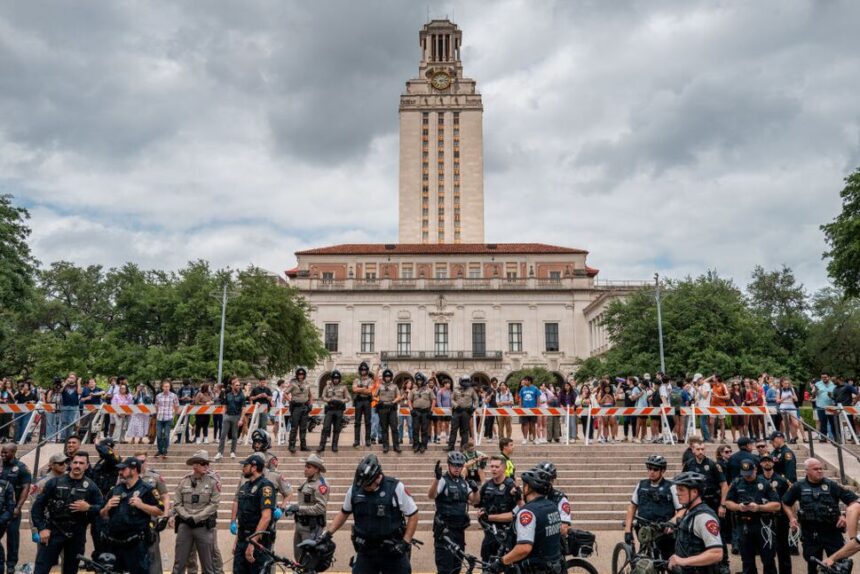University leaders across the country are grappling with how to respond to student protests over the Israel-Hamas war, with many trying to balance conflicting pressures from boards, faculty, students, alumni and donors as they look to wrest back control of their campuses with commencement ceremonies approaching.
Protest encampments have popped up at dozens of college campuses, where pro-Palestinian demonstrators have called on universities to disclose and divest of their links to Israel. Some of the protests have been condemned for involving antisemitic behavior or actions. Lawmakers and stakeholders have increasingly turned to university officials to respond to the demonstrations – and to justify their actions.
University leaders, in their own words, as the movement has escalated in recent days:
Chancellor Gene Block, University of California, Los Angeles, April 30:
“UCLA supports peaceful protest, but not activism that harms our ability to carry out our academic mission and makes people in our community feel bullied, threatened and afraid. These incidents have put many on our campus, especially our Jewish students, in a state of anxiety and fear.
In response, we have taken several immediate actions. We have significantly increased our security presence in the area, including adding greater numbers of law enforcement officers, safety personnel and student affairs mitigators. We have also engaged law enforcement to investigate the recent acts of violence.”
The Best Cartoons on Education
“A little after 9 p.m. this evening, the NYPD arrived on campus at the University’s request. This decision was made to restore safety and order to our community.
We regret that protesters have chosen to escalate the situation through their actions. After the University learned overnight that Hamilton Hall had been occupied, vandalized, and blockaded, we were left with no choice. Columbia public safety personnel were forced out of the building, and a member of our facilities team was threatened. We will not risk the safety of our community or the potential for further escalation.”
Interim Chancellor Lee Roberts and Provost Christopher Clemens, University of North Carolina at Chapel Hill, April 30:
“We were disappointed that we had to take action this morning regarding protesters, including many who are not members of the Carolina community, who violated state law and University policies that provide for peaceful demonstration.
No one has the right to disrupt campus operations materially, nor to threaten or intimidate our students, nor to damage and destroy public property.”
President Carol Folt, University of Southern California, April 30:
President Christina Paxson, Brown University, April 30:
“Brown has always prided itself on resolving differences through dialog, debate and listening to each other. I cannot condone the encampment, which was in violation of University policies. Also, I have been concerned about the escalation in inflammatory rhetoric that we have seen recently, and the increase in tensions at campuses across the country. I appreciate the sincere efforts on the part of our students to take steps to prevent further escalation.”
President Peter Salovey, Yale University, April 29:
“Peaceful protest and activism have a long history on college campuses, and I fully support every individual’s right to free expression at Yale. What occurred yesterday on Cross Campus was the opposite of free expression. Some protesters set up rows of tents on Cross Campus and restricted access to the encampment. Those protesters asked individuals who wished to pass through or enter their area, which is a shared campus space, to agree with their political viewpoints. This action is unacceptable and antithetical to the very purpose of a university.”
President Minouche Shafik, Columbia University, April 29:
“The encampment has created an unwelcoming environment for many of our Jewish students and faculty. External actors have contributed to creating a hostile environment in violation of Title VI, especially around our gates, that is unsafe for everyone – including our neighbors. With classes now concluding, it represents a noisy distraction for our students studying for exams and for everyone trying to complete the academic year.”
“For any demonstrators refusing to comply with the agreed-upon path forward, the University will take action to protect the safety of the community and enforce University rules and policies. These steps will include the suspension of non-compliant students and a requirement that non-affiliated individuals leave campus.”
President Gregory Fenves, Emory University, April 29:
Based on the information we had early Thursday morning, we determined that the individuals who constructed the encampment on our Quad were not members of our community. It is clear to us now that this information was not fully accurate, and I apologize for that mischaracterization. My goal was to remove a growing encampment, as allowing such an encampment would have been highly disruptive, affecting everything from classes and exams to our ability to hold Commencement. I remain firm that such encampments cannot be permitted at Emory.
Let me be clear: I am devastated that members of our community were caught up in law enforcement activity enforcing the removal of the encampment. The videos of these interactions are deeply distressing
President Jere Morehead, University of Georgia, April 29:
“This morning’s encampment on the North Campus Quad crossed a line and violated our policies.
After multiple warnings that they would be arrested for trespass if they did not comply with our policies, at 8:30 a.m., UGA Police were left with no choice but to arrest those who refused to comply. Any students, faculty or staff members arrested could also face further disciplinary action by the University.
Let us make it abundantly clear that while the University of Georgia staunchly supports freedom of expression, we will not cede control of our campus to groups that refuse to abide by University policy and threaten the safety of those who live, work and study here.”
President Ted Carter, The Ohio State University, April 29:
“What occurred on our campus on April 25 was not about limiting free speech. It was an intentional violation of university space rules. …. At approximately 10 p.m., law enforcement began the process of arresting and charging individuals with criminal trespass for knowingly violating university policy and police orders.
Thursday’s actions were not about the content of anyone’s speech. They do not mean we are limiting individuals’ right to gather and demonstrate. They do mean that Ohio State will continue to uniformly enforce our space rules as well as take the actions that support the safety and security of our community as a whole.”
President Tim Sands, Virginia Polytechnic Institute and State University, April 29:
“Last night, 82 protesters (largely students) were arrested for trespassing after occupying the Graduate Life Center lawn for three days and repeatedly refusing to comply with university policy and public safety regulations.
Virginia Tech strongly supports free speech, even when the content of that speech may be disagreeable to some. However, those rights do not extend beyond the point where they interfere with the rights of others, violate our policies, the Code of Virginia, or federal laws and/or create a threat to safety for others.”
President Sally Kornbluth, Massachusetts Institute of Technology, April 27:
“There’s a distinction between what we can say – what we have a right to say – and what we should say as members of one community. But this is what makes this situation different from past protest movements, and uniquely difficult: the fact of two opposing groups on campus, both grieving – and both painfully at odds with each [other]. These opposing allegiances extend to faculty and staff as well. … Under the circumstances, what I must continue to do, here on our campus, is to take every step in my power to protect the physical safety of our community – and to strive to make sure everyone at MIT feels free to do the work they came here for.”
President Troy Paino, University of Mary Washington, April 27:
“On Saturday evening, the event was canceled and attendees were instructed to leave the area. After some time, 12 individuals remained in Jefferson Square and were arrested for trespassing, including 9 students.”
“We are mindful that we are in the midst of reading days and heading into exam week. We do not seek punitive action toward our students with the end of the semester and commencement so close. We will be continuing this conversation, extending grace and understanding, and bringing the resources together to help us all heal.”
“ASU Police arrested 72 people for trespassing after they set up an unauthorized encampment Friday, in violation of university policy. Encampments are prohibited on Arizona State University property. … While the university will continue to be an environment that embraces freedom of speech, ASU’s first priority is to create a safe and secure environment that supports teaching and learning.”
Chancellor Robert Jones, University of Illinois, April 26:
“This afternoon, when university police officers attempted to escort university staff into the area to remove the encampment structures violating university policy, members of the demonstrating group prevented their entry and physically resisted. This situation has escalated beyond a peaceful expression of opinion. Those who do not comply with our orders to leave will be subject to consequences, including arrest, when criminal laws are violated, and the possibility of immediate interim suspension for students.”
Dean of Students Bill Stackman, Harvard University, April 25:
“It has been a long academic year with many emails but allow me to be clear: the physical safety and well-being of our entire community is paramount, and we will continue to work together to ensure that everyone’s right to express views and engage in peaceful protest does not interfere with the academic mission and business functions of the University.”
President Jay Hartzell, University of Texas at Austin, April 25:
“Peaceful protests within our rules are acceptable. Breaking our rules and policies and disrupting others’ ability to learn are not allowed. The group that led this protest stated it was going to violate Institutional Rules. Our rules matter, and they will be enforced. Our University will not be occupied.
The protesters tried to deliver on their stated intent to occupy campus. People not affiliated with UT joined them, and many ignored University officials’ continual pleas for restraint and to immediately disperse. The University did as we said we would do in the face of prohibited actions. We were prepared, with the necessary support to maintain campus operations and ensure the safety, well-being and learning environment for our more than 50,000 students.”











